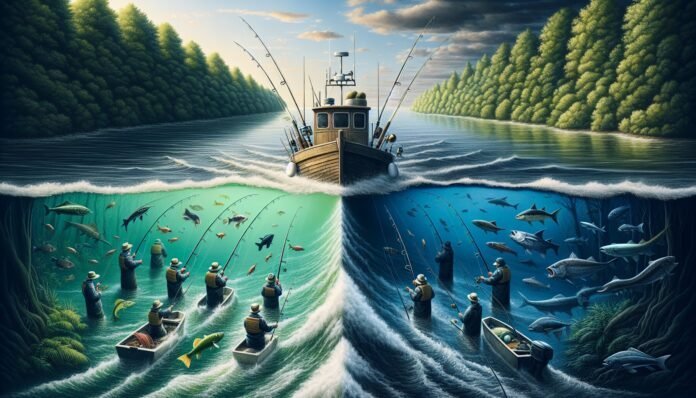Freshwater saltwater boat fishing offers two distinct experiences that challenge anglers in unique ways. Did you know that over 70% of the earth’s surface is covered in water, yet the tactics, gear, and environments between freshwater and saltwater fishing differ greatly? This post explores the nuances of fishing from a boat in these contrasting habitats, from the equipment you’ll need to the species you’ll target. Whether you’re navigating calm lakes or battling ocean waves, understanding these differences is essential for success. Dive into the details to elevate your fishing adventures.
Understanding the Basics of Freshwater vs Saltwater Boat Fishing
Freshwater and saltwater fishing offer unique experiences. Both environments present distinct challenges and rewards for anglers. Understanding the differences can enhance your fishing success and enjoyment.
Key Differences in Fishing Environments and Conditions
Fishing environments in freshwater and saltwater vary greatly. Freshwater bodies include lakes, rivers, and streams. Saltwater fishing occurs in oceans, seas, and estuaries. These settings differ in terms of water salinity, temperature, and depth. Freshwater usually has less salinity and more stable conditions. Saltwater environments are dynamic, with tides and currents influencing fishing strategies. Water clarity and weather patterns further distinguish these two realms, impacting fish behavior and accessibility.
Freshwater fishing often involves navigating smaller bodies of water. Anglers may face obstacles like vegetation and limited space. Saltwater fishing requires adapting to larger, open areas. Challenges include managing tides and avoiding coral reefs or sandbanks. Each environment demands a tailored approach to location and technique.
How Water Types Influence Fishing Techniques and Strategies
Fishing techniques vary based on water type. Freshwater fishing often uses baitcasting or spinning gear. Techniques like trolling or still fishing prove effective. In contrast, saltwater fishing employs tactics like deep-sea fishing or surfcasting. These methods require specialized equipment and skills.
Freshwater anglers target species such as bass, trout, or catfish. Techniques include using lures or live bait in specific habitats. Saltwater anglers pursue species like tuna, marlin, or redfish, often employing chumming or trolling offshore. Understanding the nuances of each technique can significantly impact success rates.
Common Myths About Fishing in Freshwater and Saltwater
Misconceptions about fishing persist among enthusiasts. Some believe freshwater fishing is always easier due to calmer waters. However, species like pike or muskie can pose significant challenges. Similarly, saltwater fishing isn’t solely about large, trophy fish. Numerous smaller species offer rewarding catches.
Another myth suggests saltwater fishing requires more expensive gear. While specialized equipment benefits certain techniques, freshwater fishing also demands quality gear for success. Understanding and debunking these myths can lead to more informed and enjoyable fishing experiences.
Essential Gear for Freshwater and Saltwater Boat Fishing
Success in boat fishing hinges on the right gear. Freshwater and saltwater fishing require different equipment. Choosing the appropriate tools enhances performance and enjoyment on the water.
Comparing Rods, Reels, and Lines for Different Water Types
Rods and reels vary between freshwater and saltwater fishing. Freshwater rods often feature lighter, more flexible designs. They’re suited for lighter lines and smaller fish. Saltwater rods, however, are robust, built to handle the power of oceanic species.
Reels also differ. Freshwater reels are usually smaller and less resistant to corrosion. Saltwater reels are designed for durability against salt exposure. Lines used in saltwater are often heavier and more abrasion-resistant. Freshwater lines prioritize finesse and subtlety for cautious fish.
Special Equipment Needed for Saltwater Fishing vs Freshwater
Saltwater fishing demands additional gear to withstand harsh conditions. Equipment like stainless steel hooks, heavy-duty nets, and corrosion-resistant tackle boxes are essential. Protective clothing and sunblock protect against UV exposure during extended trips.
Freshwater fishing generally requires a simpler setup. Basic tackle, polarized sunglasses, and a reliable fish finder can suffice. Each environment’s unique demands necessitate consideration of gear choices and investment.
Boat Types and Accessories for Optimal Fishing Experiences
Boat selection impacts fishing success. Freshwater boats, like bass boats or jon boats, are designed for agility and shallow waters. These boats often come with fish finders and trolling motors for precision.
Saltwater boats include center consoles or sportfishing yachts. These vessels handle open waters and rough conditions. Accessories like outriggers and live wells support diverse fishing techniques. Understanding boat specifications and accessories enhances both safety and efficiency on the water.
Targeting Fish Species: Freshwater vs Saltwater Boat Fishing
Freshwater and saltwater environments host diverse fish species. Knowing where and when to find these species enhances angling success. Each setting offers unique opportunities for targeting prized catches.
Popular Freshwater Fish Species and Their Habitats
Freshwater fisheries host species like largemouth bass, crappie, and walleye. Largemouth bass thrive in warm, weedy environments. Crappie prefer submerged structures in calm waters. Walleye are often found in deeper, cooler areas of lakes and rivers.
Habitat understanding is crucial for locating freshwater fish. Vegetation, water depth, and temperature guide successful fishing strategies. Adjusting techniques to match fish habitats increases the likelihood of a productive outing.
Top Saltwater Game Fish and the Best Locations to Find Them
Saltwater fishing presents opportunities to catch species like marlin, tarpon, and snapper. Marlin prowls the open ocean, requiring deep-sea expeditions. Tarpon frequent coastal waters, known for their acrobatic fights. Snapper lives near reefs, providing exciting challenges for anglers.
Location plays a critical role in saltwater fishing success. Ocean currents, weather conditions, and time of year influence fish movement. Identifying prime fishing locations can lead to unforgettable catches.
Seasonal Tips for Catching Fish in Freshwater and Saltwater
Seasonal changes greatly impact fish activity. In freshwater, spring and fall are peak times for bass due to moderate temperatures. Summer evenings can be productive for catfish in warmer waters.
Saltwater species often migrate with changing seasons. Spring and summer attract species like mahi-mahi closer to shore. Winter offers opportunities for catching striped bass in coastal waters. Adapting to seasonal patterns enhances angling success across both environments.
Conclusion
Freshwater and saltwater fishing differ in environments, techniques, and gear requirements, with freshwater typically involving calmer, smaller waters and saltwater presenting dynamic conditions. Freshwater fishing often targets species like bass and trout, while saltwater focuses on species such as marlin and snapper, using tailored equipment for each scenario. Saltwater gear must endure harsher conditions, including corrosion, while freshwater gear prioritizes finesse and lighter designs. Seasonal and habitat-specific strategies play a crucial role in targeting fish species effectively in both water types. Boat selection and accessories vary, with freshwater boats designed for shallow waters and saltwater vessels built for handling open seas.
FAQ
What are the best types of boats for freshwater and saltwater fishing?
Choosing the right boat depends on the fishing environment. For freshwater, bass boats, pontoon boats, and aluminum fishing boats offer excellent maneuverability and stability. In saltwater, center console boats, walkaround boats, and sportfishing yachts withstand rough waters and provide necessary storage for gear.
How does saltwater affect the maintenance and care of a fishing boat?
Saltwater can be corrosive to boat materials, requiring regular rinsing with fresh water. Protective coatings on metal parts help prevent rust. Antifouling paint can reduce marine growth on the hull. Regular inspections of engines and electronics ensure optimal performance and longevity.
What equipment is essential for boat fishing in freshwater and saltwater?
Fishing rods and reels, tackle boxes, and bait are fundamental for both environments. In saltwater, durable equipment that resists corrosion is crucial. Fish finders and GPS devices assist in navigation and locating fish. Safety gear such as life jackets and first aid kits are vital for all trips.
Can I use the same boat for both freshwater and saltwater fishing?
Some boats can handle both environments effectively. Versatile designs like center consoles or dual consoles adapt to different water conditions. Proper maintenance, especially rinsing with fresh water after saltwater use, ensures your boat remains in good condition.
What are the safety tips for fishing from a boat in saltwater and freshwater?
Always wear a life jacket and monitor weather conditions. Keep a communication device handy and inform someone of your fishing location and expected return time. Knowledge of the local waterway regulations and conditions enhances safety. Carrying a first aid kit and knowing basic safety procedures is essential.
How do fishing conditions differ between freshwater and saltwater environments?
Freshwater fishing often involves calmer lakes and rivers, with fish such as bass and trout. Saltwater environments, such as oceans, present more variable conditions and a wider range of species, including tuna and marlin. Tidal changes, currents, and weather can impact both types of fishing experiences significantly.

